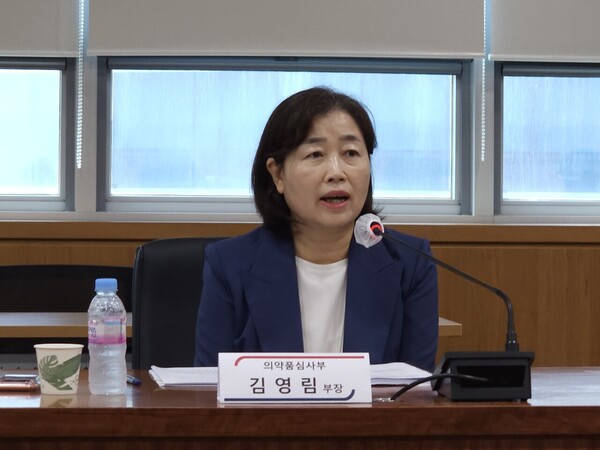The Ministry of Food and Drug Safety (MFDS) has rolled up its sleeves to support the development of homegrown anticancer drugs by, for instance, providing customized counseling and clinical trial design support.

Kim Young-rim, head of the Drug Review Division at the National Institute of Food and Drug Safety (NIFDS), explained her division’s administrative plans and improved regulations in a meeting with reporters on Tuesday. More specifically, Kim cited support for incrementally modified drugs (IMDs), customized support for generic anticancer and high-tech drugs, and support for efficient review and design of clinical trial plans as priority tasks for development support.
The ministry and the institute have operated the “K-Generic Anticancer Drug Customized Consultation System” since May to support the development of homegrown generic anticancer drugs. As part of such efforts, evaluators visited Boryung (formerly Boryung Pharmaceutical), a pharmaceutical company developing generic anticancer drugs, in August.
Besides Boryung, four other companies have applied for customized consultations.
"Anticancer drugs are very marketable. If generic anticancer drugs are developed, I think it will be very helpful for exports and national finances," Kim said. "Among Korean companies, Boryung is the most advanced, developing generic anticancer drugs that graft nanotechnology."
Kim went on to say that generic anticancer drugs require additional considerations, such as target patients and safety evaluation items. They are difficult to develop, so active support is needed from the early stages of development. Boryung also plans a clinical trial of a generic anticancer drug and has contacted the institute.
"We have designated a person in charge to listen to their difficulties and provide customized, close, and frequent consultations by answering development inquiries," she added.
In addition, the ministry will help design clinical trials so that clinical trials targeting multiple cancer types or genetic mutations can be conducted at once. It is preparing to introduce the “master protocol” and plans to establish guidelines in November.
The idea is to help efficiently conduct clinical trials. For instance, if existing clinical trials deal with only administering drug A to non-small cell lung cancer, the government will help future ones include drug A for EGFR-mutated NSCLC, drug B for T790M-mutated NSCLC, and drug C for BRAF-mutated NSCLC in a single clinical trial design.
"With the introduction of the concept of patient-customized precision medicine, there has been a continuous need for clinical trial design that can effectively conduct clinical trials for a small number of patients with biomarkers or specific gene mutations," Kim said. "We aim to introduce a new type of 'master protocol' to evaluate the effectiveness and safety of new drugs for multiple cancers or multiple gene mutations in one clinical trial."
She noted that this is expected to rapidly transform clinical trials into higher quality, shorter duration, and more efficient trials while reducing costs.
Kim, appointed division head in July, expressed her ambition to find the direction of regulatory innovation and keywords for its development while resolving current issues and establishing the basic framework to become an indispensable and respected organization in conjunction with related policy and research departments.
"In particular, I would like to encourage employees who quietly handle a high volume of civil affairs and listen to external voices so that the inside and outside can communicate and cooperate and develop together," Kim said. "I will think about the core values of public servants and strive to make the best decisions for public health."

